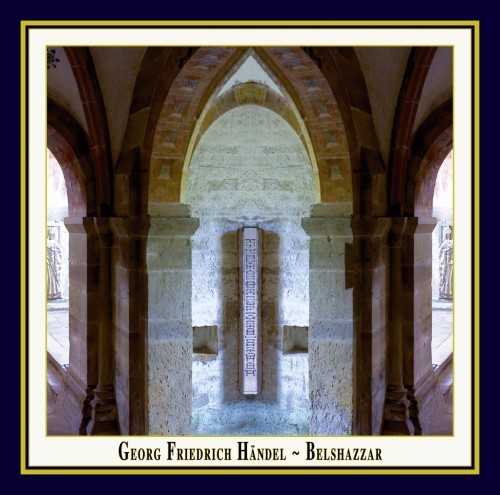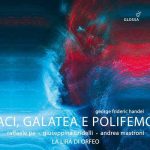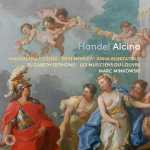
Composer: Georg Friedrich Händel
Performer: Maulbronn Chamber Choir
Orchestra: Hanoverian Court Orchestra
Conductor: Jürgen Budday
Audio CD
Number of Discs: 1
Format: FLAC (tracks)
Label: KuK67
Size: 2.39 GB
Recovery: +3%
Scan: yes
Miriam Allan, soprano (Nitocris)
Michael Chance, countertenor (Daniel)
Patrick van Goethem, countertenor (Cyrus)
Mark Le Brocq, tenor (Belshazzar, Arioch)
André Morsch, bass (Gobrias, Messenger)
Belshazzar HWV 61 (1751 Version)
Oratorio in three acts – an historically informed performance in English
Disc 01
01 Act I Scene 1: Overture
02 Act I Scene 1: Behold, by Persia’s hero made (Chorus of Babylonians)
03 Act I Scene 2: Recitative: Well may they laugh, from meagre famine safe (Gobrias, Cyrus)
04 Act I Scene 2: Aria: Oppress’d with never-ceasing grief (Gobrias)
05 Act I Scene 2: Aria: Dry those unavailing tears (Cyrus)
06 Act I Scene 2: Recitative: Be comforted (Cyrus)
07 Act I Scene 2: Recitative: Methought, as on the bank of deep Euphrates (Cyrus)
08 Act I Scene 2: Recitative: Now tell me, Gobrias, does not this Euphrates (Cyrus, Gobrias)
09 Act I Scene 2: Aria: Behold the monstrous human beast (Gobrias)
10 Act I Scene 2: Recitative – Aria: Can you then think it strange (Cyrus)
11 Act I Scene 2: Recitative: My friends, be confident and boldly enter upon this high exploit (Cyrus)
12 Act I Scene 2: All empires upon God depend (Chorus of Persians)
13 Act I Scene 3: Aria: O sacred oracles of truth (Daniel)
14 Act I Scene 3: Recitative: Rejoice, my countrymen! (Daniel)
15 Act I Scene 3: Sing, O ye Heav’ns, for the Lord hath done it! (Chorus of Jews)
16 Act I Scene 4: Aria: Let festal joy triumphant reign (Belshazzar)
17 Act I Scene 4: Recitative: For you my friends, the nobles of my court (Belshazzar, Nitocris)
18 Act I Scene 4: Recall, O king, thy rash command (Chorus of Jews)
19 Act I Scene 4: Recitative: They tell you true (Nitocris, Belshazzar)
20 Act I Scene 4: Duet: O dearer than my life, forbear (Nitocris, Belshazzar)
21 Act I Scene 4: By slow degress the wrath of God (Chorus of Jews)
22 Act II Scene 1: See, from his post Euphrates flies (Chorus of Persians)
23 Act II Scene 1: Recitative: You see, my friends, a path into the city lies open (Cyrus)
24 Act II Scene 1: To arms, to arms, no more delay! (Chorus of Persians)
Disc 02
01 Act II Scene 2: Ye tutelar gods of our empire (Chorus of Babylonians)
02 Act II Scene 2: Aria: Let the deep bowl thy praise confess (Belshazzar)
03 Act II Scene 2: Recitative: Where is the God of Judah’s boasted pow’r? (Belshazzar)
04 Act II Scene 2: Chorus – Recitative: Help, help the king! (Belshazzar)
05 Act II Scene 2: Recitative: Call all my Wise Men (Belshazzar)
06 Act II Scene 2: Recitative: Ye sages, welcome always to your king (Belshazzar, Wise Men)
07 Act II Scene 2: Oh, misery! Oh terror, hopeless grief! (Chorus of Babylonians)
08 Act II Scene 2: Recitative: O king, live for ever! (Nitocris, Belshazzar)
09 Act II Scene 2: Aria: No, to thyself thy trifles be (Daniel)
10 Act II Scene 2: Reicitative: Yet, to obey His dread command (Daniel)
11 Act II Scene 2: Recitative: Oh, sentence too severe (Nitocris)
12 Act II Scene 2: Aria: Regard thyself (Nitocris)
13 Act II Scene 3: Aria: O God of truth, O faithful guide (Cyrus)
14 Act II Scene 3: Recitative: You, Gobrias, lead directly to the palace (Cyrus)
15 Act II Scene 2: O glorious prince, , thrice happy they born to enjoy thy future sway (Chorus of Persians)
16 Act III Scene 1: Aria: Alternate hopes and fears distract my mind (Nitocris)
17 Act III Scene 1: Recitative: My hopes revive, here Arioch comes! (Nitocris, Arioch, Messenger)
18 Act III Scene 1: Bel boweth down, Nebo stoopeth! (Chorus of Jews)
19 Act III Scene 2: Aria: I thank thee, Sesach! (Belshazzar)
20 Act III Scene 2: A Martial Symphony
21 Act III Scene 3: Aria: To pow’r immortal my first thanks are due (Gobrias)
22 Act III Scene 3: Recitative: Be it thy care, good Gobrias (Cyrus)
23 Act III Scene 3: Aria: Destructive war, thy limits know (Cyrus)
24 Act III Scene 3: Duet: Great victor, at your feet I bow (Nitocris, Cyrus)
25 Act III Scene 3: Recitative: Say, venerable prophet, is there aught (Cyrus, Daniel)
26 Act III Scene 3: Tell it out among the heathen (Soloists, Chorus)
27 Act III Scene 3: Recitative: Yes, I will build thy city, God of Israel! (Cyrus)
28 Act III Scene 3: I will magnify Thee, O God my king (Daniel, Nitocris, Chorus)
For a long time my favorite Maccabaeus has been the Mackerras version on Archiv, with Janet Baker. This recording, conducted by Jurgen Budday, is an Historically Informed Performance, which means they used original instruments and techniques (less string vibrato, smaller orchestra sections with more transparent sound, men using falsetto in place of women in some parts, for example). I will compare the merits of these two.
This Budday HIP performance has gotten under my skin for several reasons: the conducting is exciting and very tasteful; the DDD sound is outstanding; the soloists are excellent, fresh, and stylistically intelligent; the HIP orchestra is tight and accompanies the singing deftly! I had never even heard of Jurgen Budday before.
Mackerras is excellent too, so I am not abandoning that recording any time soon; that recording is ADD, on modern instruments, and not all the soloists sound as fresh or as idiomatic as they do on this Budday recording – which really opened my ears.
To begin with Budday’s tempi are buoyant – not simply fast, but well sprung. There is an energy which I think comes in part from it being a live performance. Budday’s performance is about 20 minutes shorter than Mackerras’ and is thus on 2 disks instead of 3. Mackerras is also a lively conductor and knows his way around Handel; in many ways his performance is a revelation, he is very sensitive in the solo accompaniment, and there is never any feeling of dragging. It must be said that both conductors have put themselves at the service of this music – individual personalities do not emerge to over-interpret Handel’s musical and dramatic intentions. The music is allowed to speak for itself in both recordings, and the big moments (“See the Conqu’ring Hero”, for example) are given their full due, making great impact (and an interesting contrast) in either scale.
The digital sound on the Budday CDs is excellent, catching the details of the soloists, choir, and orchestra as if it were a studio recording, but with the added atmosphere of a live hall – it sounds absolutely great in my listening room (using Yamaha 200W amp, ADS 9 speakers, and Denon CD player equipment). The Mackerras recording has great studio sound which I would characterize as detailed and full, but less atmospheric since it’s ADD and not live. It also sounds a little “closer”, which is an artifact of being a studio recording.
Budday’s soloists are all excellent and have beautiful voices! They all sound young, fresh, and in particular they sound as if they all live with this kind of music. They sing gloriously – bright and strong in the ensembles, tender and quite moving in solos and duets. The choir (Maulbronner Chamber Choir) is less massive than modern performances tend to use – and thus more detailed and clear, and in some places men use falsetto in place of women in some alto solos, to haunting effect. Mackerras’ soloists are all great singers, some of whom are opera stars and others whom are known for HIP careers. Janet Baker in particular is simply captivating, and her duets with Felicity Palmer are quite moving. The Wandsworth School Choir, boys, sounds larger and fuller, thus less detailed and clear by comparison. I know some people feel boys choirs sound too homogeneous, but I think it works well here.
Budday’s orchestra (Musica Florea Prag) uses original instruments and HIP techniques and they sound wonderful, you hear everything. The string sound is warm (early HIP performances could sound “dry” to modern ears). The playing is technically excellent, crisp, often breathtaking, and always very sensitive. Mackerras’ orchestra, English Chamber Orchestra, is closer to a modern symphony orchestra. They sound full and warm, with a richness that many listeners have become accustomed to, but they are also crisp and totally inside this music.
The one drawback to the Budday recording (on the little-known K&K label) is the lack of notes and text. The Mackerras CD comes with generous notes about the music and the full text, too.
What to do, what to do? If you’re looking for an accurate rendering of this music that is close to what Handel’s audience heard, than this Budday recording is the one. If you’re a Janet Baker fan (like I am), then Mackerras will be for you. If you prefer digital sound, then Budday is the way to go (although both sound great). If you like to hear the intricate details in the orchestra and chorus, well, then Budday is for you.



